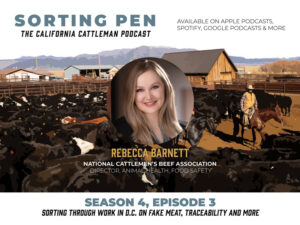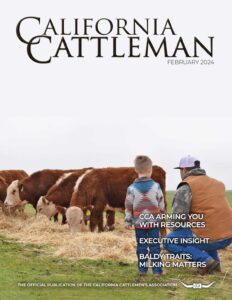
CALIFORNIA CATTLEMAN WEEKLY
February 5, 2024
To read the full version each week, please subscribe below.
Gov. Proclaims State of Emergency in So. California Due to Ongoing Winter Storms
As an atmospheric river continues to pound Southern California and the Central Coast with damaging winds and heavy rain and snowfall that heightens flood risks, Governor Gavin Newsom yesterday responded by proclaiming a state of emergency for the counties of Los Angeles, Orange, Riverside, San Bernardino, San Diego, San Luis Obispo, Santa Barbara and Ventura.
In anticipation of the severe storms, Newsom on Friday had mobilized 8,300 emergency response personnel and “activated [California’s] State Operations Center, Flood Operations Center, Caltrans Emergency Operations Center and the Medical Health Coordination Center.”
While the state of emergency is currently limited to the Central Coast and Southern California, storm impacts have been felt statewide, with more than half a million Californians throughout the state waking up this morning without power.
The National Weather Service (NWS) has issued severe weather warnings – including flood and flash flood advisories – for several counties. CCA advises members to stay abreast of the NWS forecasts and alerts for your area in the days to come. Members are encouraged to keep CCA staff apprised of any emergency actions necessary to protect your herds, homes and families, and do not hesitate to contact CCA if we can assist in coordinating emergency response with CalOES or other state or local agencies.
CalChamber Sues the State Over SB 253 Emissions Disclosure Requirements
The California Chamber of Commerce (CalChamber) announced last week that it has joined the U.S. Chamber of Commerce and other groups in a lawsuit challenging Senate Bill 253 (Wiener), the “Climate Corporate Data Accountability Act” signed into law last year. SB 253 requires companies with annual revenues over $1 billion which do business in California to annually report their greenhouse gas (GHG) emissions to the California Air Resources Board – including “scope 3” emissions related to the companies’ entire supply chains.
CCA strongly opposed SB 253 last year, concerned that the bill would harm ranchers and beef producers in major corporations’ supply chains. Specifically, CCA was concerned that the bill could incentivize corporations to pass down costly and burdensome emissions reporting requirements to small ranchers; could incentivize those corporations to contract with larger operations more capable of accurate emissions reporting at the expense of small family operations; and could incorrectly inflate ranchers’ contributions to GHG emissions.
CalChamber’s lawsuit alleges that SB 253 compels corporate speech regarding an issue of “controversial political matters” in violation of the First Amendment of the U.S. Constitution. The lawsuit also argues that by targeting major national and multi-national corporations and requiring disclosure of a corporations GHG emissions “regardless of location” from which those emissions occur, the state law is a de facto nationwide regulation of such emissions. For this reason, CalChamber alleges that SB 253 intrudes upon the jurisdiction of the federal Clean Air Act in violation of the Constitution’s Supremacy Clause and encoraches upon regulation of interstate commerce in violation of the Constitution’s Commerce Clause.
Sen. Weiner lambasted the lawsuit, writing in a press release that “The Chamber and large corporate polluters don’t want the public to know how much they’re strangling the planet with carbon emissions — that’s why they filed this baseless lawsuit.”
CCA continues to seek legislative and regulatory action to ensure SB 253 does not harm ranchers in large corporations’ supply chains and will update members on the progress of the CalChamber lawsuit.
McGuire Becomes Senate President Pro Tempore
Sen. Mike McGuire (D-Healdsburg) was sworn in this afternoon as the new President pro tempore of the California State Senate, taking over the leadership role from Sen. Toni Atkins (D-San Diego). Atkins, who is term-limited from seeking reelection in 2024, has announced her candidacy for Governor in the 2026 election.
McGuire’s tenure as leader of the state’s upper chamber will be relatively brief, as the lawmaker terms out in 2026.
The growing insurance crisis is likely to be one priority of President pro tempore McGuire. In an interview with Politico, McGuire noted that “Entire communities in the North Coast district that I proudly work in have been impacted and devastated over the past many years. Thousands upon thousands of homes lost, millions of acres charred, and coming out of those wildfires has been this insurance crisis.” According to McGuire, “Individuals who invest their hard-earned dollars in hardening their homes should get a credit for that work,” and “insurance companies should provide a roadmap on how to get back into a traditional insurance policy” after companies fail to renew a homeowner’s policy. “The issue of insurance is incredibly complicated, but I’m a firm believer that there’s always a solution,” McGuire added.
CCA will continue to keep members apprised of major developments in the Senate under McGuire’s tenure, in particular whether the new President pro tempore makes any significant changes to the chairmanships and membership of powerful Senate committees.
Scott/Shasta Emergency Regulation Now in Effect, But No Immediate Curtailments
The State Water Resources Control Board (SWRCB) announced last week that new emergency regulations for the Scott and Shasta River watersheds are in effect as of February 1 and will remain in effect for one year (through February 1, 2025).
In an email message, the SWRCB noted that curtailment orders authorized under the emergency regulations are not currently in effect. The Scott River’s flow – as measured at the US Geological Survey’s Fort Jones gage – is well above the 200 cubic-feet-per-second (cfs) threshold under which curtailments would be triggered, and flows on the Shasta River – as measured at the Yreka gage – are above the minimum February flow of 125 cfs.
Prohibitions on surface water diversions for “inefficient livestock watering” within the Scott and Shasta River watersheds, however, are currently in effect through March 31. Inefficient diversion is defined as anything more than 10 times the “reasonable water quantities” identified for animals under California regulation (the regulation sets reasonable water need for range cattle at 15 gallons per day, for instance, so diversion of more than 150 gallons per head of cattle, on average, would classify as “inefficient livestock watering”). Those wishing to divert despite this prohibition must comply with all requirements of § 875.7(d) of the emergency regulations, here.
Assemblymember Bryan Proposes ‘Green Amendment’ to State Constitution
Last month, Assemblyman Isaac Bryan (D-Los Angeles) filed ACA 16, a proposed Constitutional amendment that would declare, in full, that “The people shall have a right to clean air and water and a healthy environment.” It is unclear what effect the Constitutional amendment would have in California. A 2012 law, for instance, already establishes a state policy “that every human being has the right to safe, clean, affordable, and accessible water adequate for human consumption, cooking, and sanitary purposes.”
CCA will closely monitor ACA 16. The bill will need to pass both chambers of the legislature by a two-thirds vote no later than June to qualify for the November ballot.
New Episode of Sorting Pen: The California Cattleman Podcast
A new episode of Sorting Pen: The California Cattleman Podcast is out now! In this week’s episode NCBA’s Director of Animal Health and Food Safety Policy Rebecca Barnett sits down with Katie at the 2024 Cattle Con in Orlando. Hear about her journey to Washington D.C. and what issues she is tackling with NCBA. To listen to the episode click here.
New Name for Weekly E-Newsletter California Cattleman Weekly Starting Today
As of today, the weekly Monday night e-newsletter will hit inboxes with the title, California Cattleman Weekly. The name change is being made to reflect that the weekly e-neswletter includes an array of information, sources, news and legislative updates. Other than the new name, the weekly e-newsletter will have no change in content or delivery.
Upcoming CCA Events
CCA Steak and Eggs Legislative and Regulatory Breakfast + Lobby Day
March 13, 2024, Sacramento, CA
Join the California Cattlemen’s Association and other CCA members at the 43rd Steak and Eggs Legislative and Regulatory Breakfast + Lobby Day. Plan to be in Sacramento on Wednesday, March 13. Breakfast starts at 8am! Over breakfast, enjoy sharing about your ranch while meeting representatives from regulatory and legislative offices in Sacramento. Following the breakfast, attendees will head across the street to the state Capitol to continue conversations about ranching in California. To RSVP for the event, email our membership and events coordinator Gracie LeCheminant at gracie@calcattlemen.org or visit our website by clicking here.
Upcoming Industry Events
UC Cooperative Extension along with UC Davis Veterinary Medicine are offering free online webinars. These webinars cover various topics related to cattle health and management. Below is a list of upcoming webinars.
Feb. 6, 2024: Foothill Abortion Management Options and Vaccine, Dr. Jeffrey Stott, UC Davis School of Veterinary Medicine and Jenna Chandler, Hygieia Biological Laboratories
The session are FREE to participate but registration is required. To register, click here.
UC Beef Cattle Symposium
March 16, 2024, UC Davis Gladys Valley Hall, Davis, CA
Unversity of California Cooperative Extension, UC Davis Department of Animal Science and UC Davis Veterinary Medicine are hosting a beef cattle symposium on Saturday, March 16, 2024 in Davis, CA. Topics that will be discussed include beef cattle health updates, beef carcass evaluation, emerging breeding technologies and much more. For more information and to register, click here.
2024 Ag Legacy Symposium
March 16, 2024, Sierra Valley Grange Hall, Vinton, CA
The 2024 Ag Legacy Symposium will take place on Saturday, March 16 in Vinton, CA. The event helps to prepare a farm, ranch or agribusiness for the transition to the next generation. The sessions will cover legal aspects, financial topics, political factors, family dynamics, and provide real life scenarios for you to consider incorporating into your succession plan. Early bird registration is $25 and includes morning refreshments, lunch, and materials. To register and view the agenda, click here.
CCA in the News
Fund for compensating ranchers for wolf-related losses nears depletion The Bakersfield Californian “But if Sacramento wants to see gray wolves reintroduced and thrive in the state, ‘then it should also be a priority for the state of California to compensate ranchers for impacts of those wolves,’ Kirk Wilbur, vice president of government affairs for the California Cattlemen’s Association, said Wednesday.” To continue reading, click here.
Industry News
2023 Regional Winners Recognized for Environmental Stewardship National Cattlemen’s Beef Association “Hart Ranch, a cow-calf operation in northern California, is dedicated to landscape and watershed rejuvenation, demonstrating the tremendous positive impacts a well-managed cow herd and grazing program has on the environment. Through strategic partnerships with various organizations and state and federal agencies, the Hart family has improved on-farm water efficiency and soil health while simultaneously bettering anadromous fish species habitat through the voluntary dedication of senior, cold-spring water rights to critical streams. And they have integrated sustainable timber management with regenerative grazing practices to maximize carbon sequestration in Klamath River watershed headwater regions. These actions have benefited not only the endangered and non-threated species that call the Hart Ranch home, but also the Hart Ranch cow herd with increased carcass quality and yield grades in the final product.” To continue reading, click here.
United States cattle inventory down 2% USDA National Agricultural Statistics Service “There were 87.2 million head of cattle and calves on U.S. farms as of Jan. 1, 2024, according to the Cattle report published today by the U.S. Department of Agriculture’s National Agricultural Statistics Service (NASS).” To continue reading, click here.
A new episode of Sorting Pen: The California Cattleman Podcast is out now! In this week’s episode NCBA’s Director of Animal Health and Food Safety Policy Rebecca Barnett sits down with Katie at the 2024 Cattle Con in Orlando. Hear about her journey to Washington D.C. and what issues she is tackling with NCBA. To listen to the episode click here.



